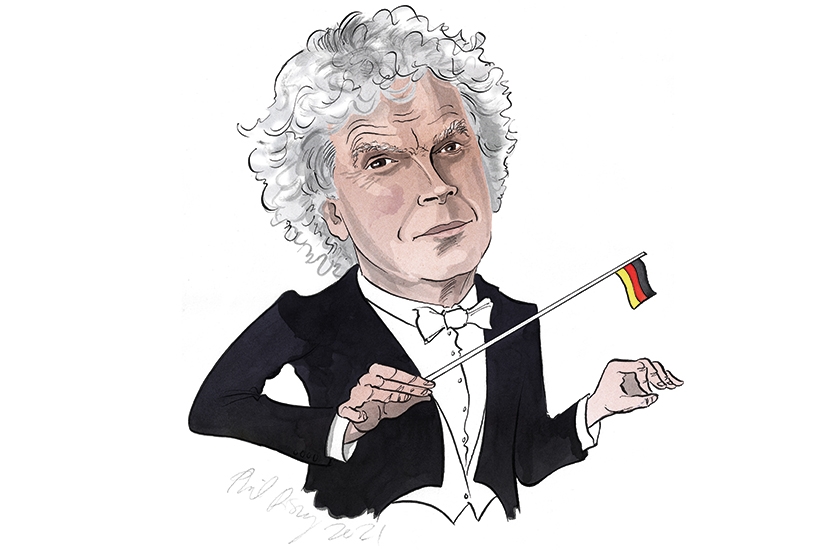In the first month of Brexit, two British orchestras were publicly beheaded. The London Symphony Orchestra was shocked to discover that its music director, Sir Simon Rattle, had taken a better job in Munich, while the City of Birmingham Symphony Orchestra was forced to accept that its luminous Lithuanian, Mirga Gražinyte-Tyla, was simply too hot to hold any longer. Some pundits quickly predicted a post-Brexit talent haemorrhage.
Of the two decapitations, the LSO’s was by far the more painful. Rattle is a totemic figure, a tousle-haired Liverpudlian who learned his scores in public libraries and won a music scholarship from the local council. He is the ultimate welfare-state success story, with a knighthood and an Order of Merit to show for it. He spent 18 years converting rustbelt Birmingham into a musical mecca.
That this personable, unpretentious, dedicated man should now declare his future in Europe and apply for German citizenship is a severe shock to the system. At the darkest hour, with concert halls shuttered and musicians facing visa hell, Rattle’s defection is being regarded, rightly or wrongly, as a loss of faith. I have heard the word ‘betrayal’ muttered by senior figures. His appearance last week at the head of a petition for renegotiating EU access for British musicians was greeted with hollow laughs. Not since Sir Thomas Beecham flitted off to America in the spring of 1940 has a conductor’s departure aroused such heated emotions.

Rattle is more than just well loved; he is sorely needed. He is the Marcus Rashford of classical music, the only maestro who can melt Etonian hearts in power. Without him, music in this country will be weaker.
Barely had that baton dropped before Birmingham lost the most brilliant conductor of a new generation, a shy Baltic woman with more natural energy than the North Sea. Over Christmas, Mirga Gražinyte-Tyla had made ‘a deeply personal decision’ to leave.
Mirga, who is 35, was hired by player acclaim after their first rehearsal together in 2015. An overnight darling with the Birmingham public, she soon won the orchestra its first record deal with the gleaming Deutsche Grammophon, among other accolades. New York and Berlin came beckoning for her spare time, but her love for the Birmingham musicians was so genuine they could not imagine her leaving any time soon. After a particularly uplifting concert, she would gather players in her dressing room to sing a madrigal together.
What changed her mind was the birth of two babies and the realisation that, from this year, travel from her home in Salzburg to Birmingham with partner, parents or childminder would be hedged with bureaucratic hurdles she had never faced before. Brexit is beyond question a large part of her reckoning, and Birmingham will look back in sorrow at the brilliance it has nurtured and lost.
For Rattle, too, personal considerations prompted his move. He has lived for the past two decades in Berlin where, for 16 years, he was principal conductor of the Philharmonic Orchestra, arguably the world’s finest. No British conductor had ever risen so high and some German old-timers did not make it easy for him, grumbling away to Berlin media as never before. The complaints were, chiefly, that he failed to nourish the string sound and that he refused to speak German. Rattle, who learned as a kid in the mean streets never to step back in a fight, stared down the malcontents and won several contract renewals, leaving only when he had a London orchestra in his sights. He impressed on the LSO that he would not live above the shop. His home would remain in Berlin, where he was married to the Czech mezzo-soprano Magdalena Kozena and had three small children.
He further demanded the unprecedented title of music director, rather than principal conductor, giving him the right to fire and hire and generally to shape the organisation to his expectations. Among the LSO’s expectations was that Rattle would campaign for a new concert hall in place of the acoustically constipated Barbican, using his prestige to secure millions of pounds from the Cameron–Osborne government and City banks. But barely had he signed the paperwork in March 2015 than the Brexit referendum was announced. Although a sinking Osborne blew a million quid on a feasibility study, the hall was a dead duck before Rattle arrived. Politicians could not be seen to favour London, and City banks were trading in post-euro futures. Still, Rattle got on better with the London players than with the Berliners, and succeeded in attracting overseas tours to boost player earnings and morale. Covid and Brexit killed off any possible revival.
A few weeks before the first lockdown, Rattle guest-conducted in Munich with Bavarian Radio, whose orchestra is second in Germany only to the Berlin Philharmonic. Barely had the applause died down before the BRSO asked him to succeed its late conductor Mariss Jansons. Rattle went home to reflect. As soon as that lockdown was lifted, he returned to Munich for a second concert. I reported the flirtation in July. LSO players say they were told nothing by Rattle until December, leaving them barely time to cobble together a face-saving statement. Rattle had demanded much and delivered little. At 66, Munich will probably be his last job. If we see him back here, it will be as a tourist.
These are harsh awakenings for British musicians and there is no backstage bar open where they can drown their feelings of abandonment. Rattle’s announcement at a Munich press conference that he was applying for German citizenship was insult added to the injury. He was becoming German, he said, as ‘an absolute necessity’, whether at the demand of his new employers or because a British passport is now an encumbrance at airports to a high-flying musician. ‘My passport is on its way,’ he told the German press.
Is this a baton rush? Antonio Pappano, Covent Garden’s music director, described Britain’s situation this week as ‘-increasingly gruesome’. Vasily Petrenko, new chief of Beecham’s Royal Philharmonic, just took a second job in Moscow. When the halls re-open, let’s see who’s left.






Comments